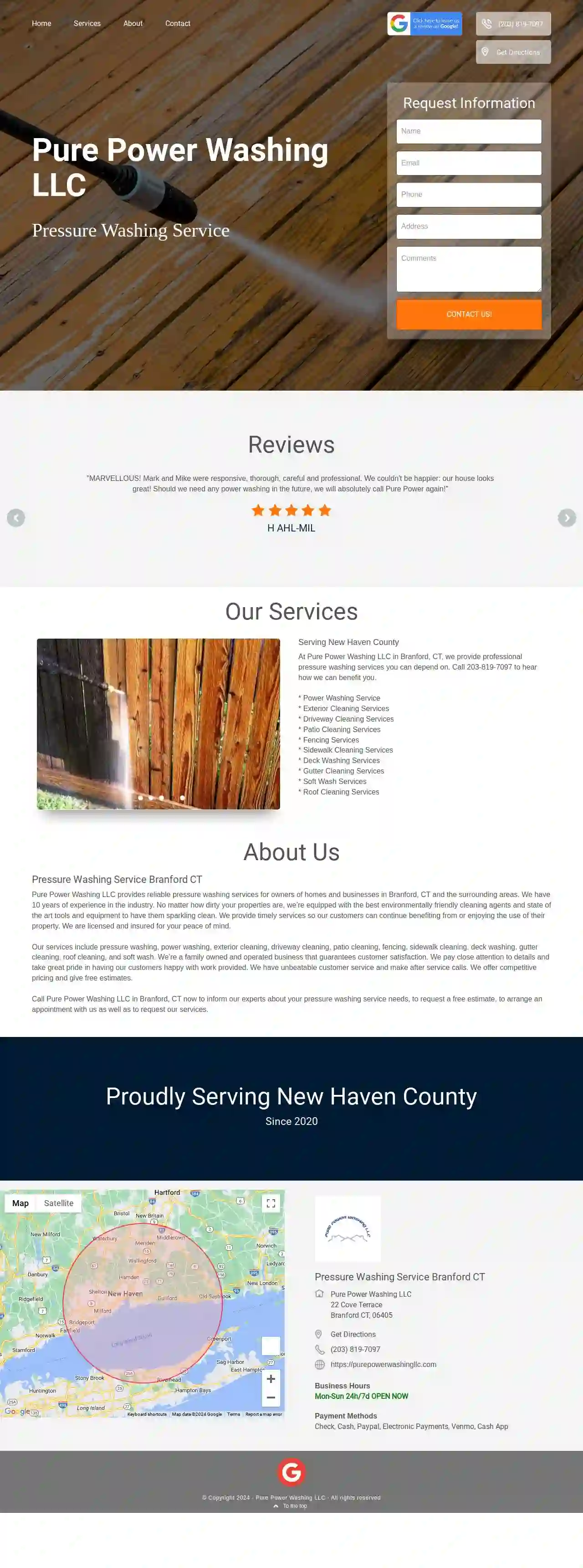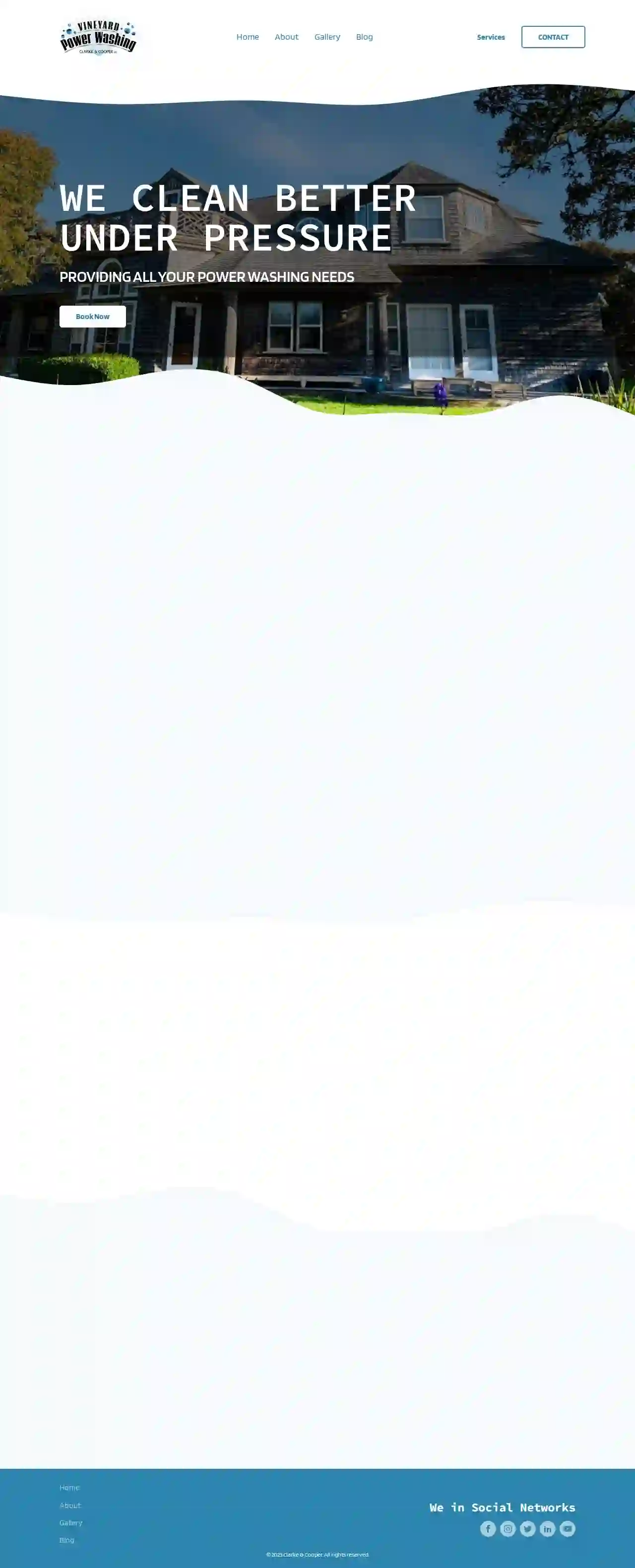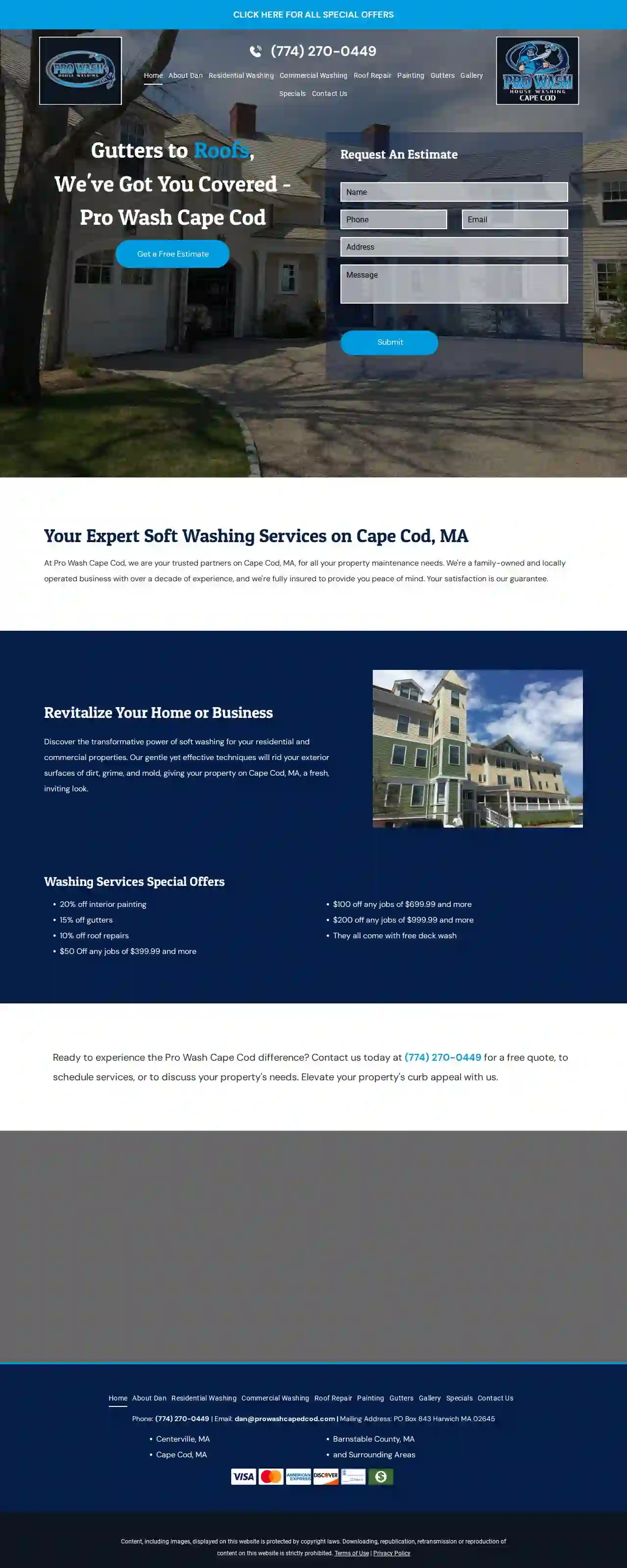Pressure Washing Millbury
Best Power Washing in Millbury
Get up to 3 Exterior Cleaning quotes for your project today! Compare profiles, reviews, accreditations, portfolio, etc... and choose the best service.

Benjamin’s Pro Power Washing, LLC
5142 reviewsBoston, USWelcome to Benjamin’s Pro Power Washing, your trusted partner in restoring the beauty and cleanliness of your property. Based out of Methuen, MA, we are dedicated to delivering top-notch, affordable power washing services to both homeowners and businesses. Led by Jake Benjamin, the founder and owner of Benjamin’s Pro Power Washing LLC, we take immense pride in revitalizing properties and exceeding our clients’ expectations. Our Mission: At Benjamin’s Pro Power Washing, our mission is simple yet significant: to enhance the aesthetic appeal and longevity of your property. With every project we aim to create a lasting impression that reflects the true potential of your property.
- Services
- Why Us?
- Our Team
- Gallery
Get Quote
Metrowest Powerwashing
55 reviewsNatick, 01760, USMetrowest Powerwashing, founded in 2005 by owner Ian Chamberlain, offers professional and efficient powerwashing services to homeowners and businesses across Metrowest from Boston to Worcester. With a commitment to quality work and reliable service, we take pride in exceeding our customers’ expectations by providing expert recommendations and advice on their washing needs.
- Services
- Why Us?
- Gallery
Get Quote
Pure Power Washing LLC
532 reviews22 Cove Terrace, Branford, 06405, USPure Power Washing LLC is a family owned and operated business serving Branford, CT and the surrounding areas. We have 10 years of experience in the pressure washing industry and are dedicated to providing reliable and professional services. Our team utilizes environmentally friendly cleaning agents and state-of-the-art equipment to ensure your property is sparkling clean. We understand the importance of timely service, so we strive to minimize disruption to your daily routine. We are licensed and insured for your peace of mind. At Pure Power Washing LLC, we take pride in our attention to detail and commitment to customer satisfaction. We offer a wide range of services, including pressure washing, power washing, exterior cleaning, driveway cleaning, patio cleaning, fencing, sidewalk cleaning, deck washing, gutter cleaning, roof cleaning, and soft wash. We offer competitive pricing and free estimates. Contact us today to discuss your pressure washing needs and experience the Pure Power Washing difference!
- Services
- Why Us?
- Our Team
- Testimonials
- Gallery
Get Quote
Vineyard Power Washing
517 reviewsEdgartown, P.O. Box 1709, 02539, USVineyard Power Washing has been established since 1976. Our team of professionals combine their years of expertise with their diligence and hard work to provide immaculate services to our clients. Vineyard Power Washing specializes in pressure washing of commercial and residential buildings, decks, furniture, patios, fences, roofs, car and boat detailing.
- Services
- Why Us?
- Gallery
Get Quote
Boston Pressure Washing
563 reviewsBoston, MA, USBoston Pressure Washing is your local pressure and soft washing experts. We understand that customer satisfaction starts with arriving at your property on time and performing a quality clean. You won't waste any valuable time waiting for our technicians. Our reliable service technicians give the same attention to detail and quality workmanship on every job. We use state-of-the-art power washing equipment with modern, environmentally-friendly methods. Choosing the right professional for the job is always the best solution. Our services are performed by trained, insured professionals. We offer a wide variety of pressure washing services, including house washing, deck cleaning, driveway cleaning, sidewalk cleaning, and more. Our team is dedicated to providing exceptional service and ensuring that our customers are completely satisfied with the work we do.
- Services
- Why Us?
- Accreditations
- Our Team
- Testimonials
- Gallery
Get Quote
Refresh Pressure Washing LLC
539 reviewsNot specified on the website., Medford, 08055, USRefresh Pressure Washing LLC is a trusted provider of professional pressure washing and soft washing services for residential and commercial properties in Medford, New Jersey, and surrounding areas. Founded in 2022, the company is dedicated to providing top-quality cleaning solutions that help clients maintain clean and attractive properties. They understand the importance of time and budget, offering flexible scheduling, competitive pricing, and free quotes for all services. Their team of highly skilled professionals is committed to exceptional customer service and exceeding expectations with every project. Refresh Pressure Washing LLC aims to deliver outstanding results that leave properties looking and feeling refreshed.
- Services
- Why Us?
- Our Team
- Testimonials
- Gallery
Get Quote
Pro Wash Cape Cod
4.56 reviewsPO Box 843, Harwich, 02645, USFor more than a decade, Pro Wash Cape Cod has provided residents and businesses with dependable house washing services. Our company was founded by Dan LaCouture in 2010 following a long 14-year career as a professional hockey player in the NHL, Europe, and Russia. Dan was born on Cape Cod, where he developed a love for hockey. He represented the US in the global arena in the Under-17 and Under-18 World Junior and World Championship Teams. Dan then attended Boston University, and in 1997, at 20 years old, he joined the Edmonton Oilers and started his pro hockey career. Over the next few years, he played for the Pittsburgh Penguins, New York Rangers, Boston Bruins, New Jersey Devils, and Carolina Hurricanes. Outside of the US, he spent a season in Russia playing in the KHL and spent time in Davos and Lugano, Switzerland and Lørenskog, Norway. Whether he's on the ice or house washing your property, Dan has always taken great pride in the work he does. He'll make sure that you're completely satisfied with the results. Call Pro Wash Cape Cod today to get your free estimate. Pro Wash Cape Cod is locally and family owned in Centerville on Cape Cod, and we're proud to be able to support a variety of important charities, events, and organizations. Pro Wash Cape Cod provides house washing services for houses, roofs, fences, decks, patios, and more to residential and commercial areas in Centerville, MA, and the surrounding areas.
- Services
- Why Us?
- Our Team
- Testimonials
- Gallery
Get Quote
Renew Power Washing LLC
4.952 reviewsMedford, USSouthern Oregon's #1 Power Washing and Soft Washing service! Turn to Renew Power Washing for all your exterior cleaning needs in Jackson and Josephine County! Our family and locally owned business provides roof moss treatment/removal, concrete cleaning, siding soft washing, graffiti removal, pool acid washing, wet media blasting, and much more! to keep your property completely clean. Renew can effectively remove dirt, grime, mold, mildew, from your property’s exterior surfaces, such as siding, roofs, decks, driveways, and sidewalks, to restore their original look and shine. A well-maintained and clean property can significantly increase its curb appeal and overall value. Renew can help you achieve this by removing all the dirt and stains that might make your property look dull and unattractive.Over time, dirt, grime, and other contaminants can build up on your property’s exterior surfaces, leading to permanent damage, such as discoloration, decay, and corrosion.Mold, mildew, and other bacteria that grow on your property’s exterior surfaces can be harmful to your health, especially if you have allergies or respiratory issues. Renew can eliminate these harmful substances, promoting a healthier and safer environment.Renew can save you time and effort that you would have spent scrubbing and cleaning your property’s exterior surfaces manually. With their professional equipment and expertise, they can quickly and efficiently clean your property, allowing you to focus on other important tasks.
- Services
- Why Us?
- Gallery
Get Quote
Stay Clean Power Washing
5246 reviews12345 North Main Street, New York, 555555, USStay Clean Power Washing is a company that wants to develop a highly successful and all around impeccable pressure washing, snow plowing, and roof washing business based out of the North Attleborough, MA area. We strive to provide high-quality residential pressure washing, house soft washing, commercial pressure washing, roof snow removal, commercial snow removal, and industrial pressure washing services to our community. We want to not only help your home or property be beautiful but be as squeaky clean as possible all year around.
- Services
- Why Us?
- Accreditations
- Our Team
- Testimonials
- Gallery
Get Quote
Pro Pressure Washing
4.935 reviewsHolden, USPro Pressure Washing is a fully insured, professional, exterior cleaning company providing homeowners and business owners in central Massachusetts with affordable, safe pressure cleaning services. Proudly serving the towns of Holden, Paxton, Princeton, Sterling, Rutland, Shrewsbury,West Boylston, Boylston, Northborough, Westborough, Worcester and throughout Worcester County.
- Services
- Why Us?
- Gallery
Get Quote
Over 60,241+ Cleaning Businesses in our network
Our cleaning services operate in Millbury & surrounding areas!
CleaningMatch has curated and vetted the Best Cleaning Services arround Millbury. Find a top & trustworthy business today.
Frequently Asked Questions About Pressure Washing
- Experience: 'How long have you been in business, and what types of pressure washing projects do you specialize in?'
- Licensing and Insurance: 'Are you licensed, insured, and bonded? Can I see proof of coverage?'
- Equipment and Techniques: 'What type of pressure washer do you use? What cleaning solutions do you use, and are they safe for my surfaces?'
- Safety Precautions: 'What safety precautions do you take during pressure washing?'
- Surface Preparation: 'Will you need to move any furniture or objects before pressure washing?'
- Water Usage: 'Do you use a water reclamation system or other methods to conserve water?'
- Cleanup: 'How do you handle cleanup after pressure washing?'
- Guarantees: 'Do you offer a satisfaction guarantee?'
- References: 'Can you provide references from previous clients?'
- Cover or Shield Plants: Before pressure washing, cover or shield delicate plants and landscaping with tarps, plastic sheeting, or painter's tape to protect them from water spray and chemicals.
- Use Lower Pressure Settings: If pressure washing near plants, use lower pressure settings and avoid directing the spray directly at them.
- Rinse Plants with Water: After pressure washing, rinse plants thoroughly with plain water to dilute any chemicals that may have landed on them.
- Choose Plant-Safe Cleaning Solutions: If using cleaning solutions, opt for environmentally friendly or plant-safe options whenever possible.
- Enhanced Curb Appeal: Pressure washing removes dirt, grime, and stains, instantly revitalizing the appearance of your property and boosting curb appeal.
- Improved Health and Safety: Pressure washing removes mold, mildew, algae, and other contaminants that can pose health risks and create slippery surfaces.
- Increased Property Value: A well-maintained exterior, achieved through regular pressure washing, can increase the value of your property.
- Preventative Maintenance: Pressure washing removes dirt and grime that can deteriorate surfaces over time, extending the lifespan of your driveway, deck, fence, and other exterior features.
- Preparation for Painting or Staining: Pressure washing is an essential step before painting or staining, as it provides a clean and receptive surface for the new coating to adhere to.
- Hard Surfaces: Pressure washing is often successful in removing graffiti from hard surfaces like brick, concrete, or metal.
- Delicate Surfaces: For delicate surfaces like wood or painted surfaces, a gentler approach using specialized graffiti removal products and techniques may be necessary.
- Professional Graffiti Removal: For stubborn or extensive graffiti, consider hiring a professional graffiti removal service. They have specialized equipment, cleaning solutions, and experience in dealing with various types of graffiti.
What questions should I ask a pressure washing contractor before hiring them?
By asking these questions, you can gather valuable information and choose a pressure washing contractor that meets your requirements.
Can pressure washing damage my plants?
Taking these precautions minimizes the risk of damage to your plants and landscaping during pressure washing.
What are the benefits of pressure washing?
Whether you're looking to improve your property's appearance, protect its value, or enhance health and safety, pressure washing is a valuable investment.
Can pressure washing remove graffiti?
If you're attempting DIY graffiti removal, always test the cleaning solution and pressure washing technique on an inconspicuous area first to avoid damaging the surface.
What questions should I ask a pressure washing contractor before hiring them?
- Experience: 'How long have you been in business, and what types of pressure washing projects do you specialize in?'
- Licensing and Insurance: 'Are you licensed, insured, and bonded? Can I see proof of coverage?'
- Equipment and Techniques: 'What type of pressure washer do you use? What cleaning solutions do you use, and are they safe for my surfaces?'
- Safety Precautions: 'What safety precautions do you take during pressure washing?'
- Surface Preparation: 'Will you need to move any furniture or objects before pressure washing?'
- Water Usage: 'Do you use a water reclamation system or other methods to conserve water?'
- Cleanup: 'How do you handle cleanup after pressure washing?'
- Guarantees: 'Do you offer a satisfaction guarantee?'
- References: 'Can you provide references from previous clients?'
By asking these questions, you can gather valuable information and choose a pressure washing contractor that meets your requirements.
Can pressure washing damage my plants?
- Cover or Shield Plants: Before pressure washing, cover or shield delicate plants and landscaping with tarps, plastic sheeting, or painter's tape to protect them from water spray and chemicals.
- Use Lower Pressure Settings: If pressure washing near plants, use lower pressure settings and avoid directing the spray directly at them.
- Rinse Plants with Water: After pressure washing, rinse plants thoroughly with plain water to dilute any chemicals that may have landed on them.
- Choose Plant-Safe Cleaning Solutions: If using cleaning solutions, opt for environmentally friendly or plant-safe options whenever possible.
Taking these precautions minimizes the risk of damage to your plants and landscaping during pressure washing.
What are the benefits of pressure washing?
- Enhanced Curb Appeal: Pressure washing removes dirt, grime, and stains, instantly revitalizing the appearance of your property and boosting curb appeal.
- Improved Health and Safety: Pressure washing removes mold, mildew, algae, and other contaminants that can pose health risks and create slippery surfaces.
- Increased Property Value: A well-maintained exterior, achieved through regular pressure washing, can increase the value of your property.
- Preventative Maintenance: Pressure washing removes dirt and grime that can deteriorate surfaces over time, extending the lifespan of your driveway, deck, fence, and other exterior features.
- Preparation for Painting or Staining: Pressure washing is an essential step before painting or staining, as it provides a clean and receptive surface for the new coating to adhere to.
Whether you're looking to improve your property's appearance, protect its value, or enhance health and safety, pressure washing is a valuable investment.
Can pressure washing remove graffiti?
- Hard Surfaces: Pressure washing is often successful in removing graffiti from hard surfaces like brick, concrete, or metal.
- Delicate Surfaces: For delicate surfaces like wood or painted surfaces, a gentler approach using specialized graffiti removal products and techniques may be necessary.
- Professional Graffiti Removal: For stubborn or extensive graffiti, consider hiring a professional graffiti removal service. They have specialized equipment, cleaning solutions, and experience in dealing with various types of graffiti.
If you're attempting DIY graffiti removal, always test the cleaning solution and pressure washing technique on an inconspicuous area first to avoid damaging the surface.